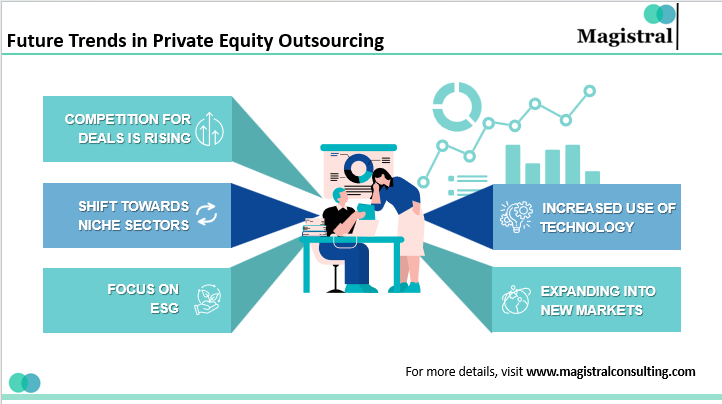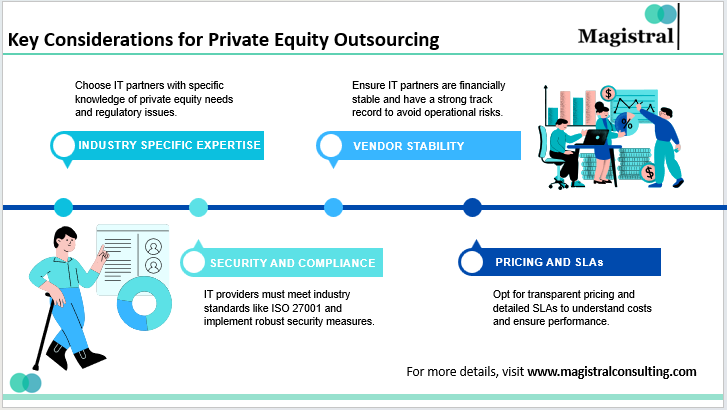Introduction
In the current dynamic private equity (PE) environment characterized by intense competition as well as constantly changing regulations, operational efficiency is indeed a very important aspect. In response to escalating problem areas facing Private Equity (PE) firms, private equity outsourcing has emerged as one of the strategies meant for achieving better efficiency, cutting down costs, and enabling concentration on core business enterprises like making investments. It is therefore essential for investors who want to keep ahead of the competition, business owners, and industry veterans to comprehend the strategic benefits of private equity outsourcing.
The Evolving Landscape of Private Equity
The global private equity market size was around $493 billion in 2023. Calculated at around $541 billion in 2024, and is expected to reach around $1,245 billion by 2033. Ever since the emergence of this type of investment, competition has intensified with the highest number of PE companies racing for fewer quality deals. Numerous regulatory hurdles have made it even more tedious during this period especially those touching issues such as ESG (Environmental Social and Governance) compliance or anti-money laundering systems.
That greater pressure has never existed before than now when there is a need to sustain high returns while keeping costs down. In fact, management fees for private equity firms have been reducing at the same time operational costs continue rising thereby affecting margins directly. Due to that reason, most firms are contemplating outsourcing their operations, with private equity outsourcing, as a way to specialize and be more operationally efficient.
Effect of Private Equity Outsourcing
Private equity outsourcing involves the delegation of activities such as deal sourcing, pre-investment analysis, and fund management to independent professionals. As a result, private equity companies can cut down operating expenses, obtain expert experience, and effortlessly increase their operations without internal growth.
According to Harvard Business Review, outsourcing can reduce operational costs by 20–30%, a key focus for private equity. An EY podcast notes average savings of 5–10%, sometimes exceeding 30%. Outsourcing also supports growth by helping firms respond quickly to market opportunities.
Private equity outsourcing enhances investor relations and fundraising success. According to WisdomTree, over 80% of advisors who outsource report stronger client relationships and more referrals, while 50% see lower operating costs. Firms can improve investor engagement through outsourced activities like CRM management and investor profiling.
Upcoming Trends in Private Equity Outsourcing
With all the technological advancements and the dynamic investment landscape and all the challenges that come with it, private equity outsourcing might experience significant changes and progress in the future. There has been an increase in the number of private equity firms that are outsourcing important functions in order to remain competitive and efficient, driven by various emerging trends:

Future Trends in Private Equity Outsourcing
Competition For Deals Is Rising
With global private equity dry powder reaching $2.5 trillion in 2024, competition for high-quality deals is fierce. Firms are increasingly turning to private equity outsourcing for deal sourcing and financial modeling so that they can quickly identify and snatch up opportunities while cutting costs.
Shift Towards Niche Sectors
Because the traditional sectors are becoming densely populated, sectors that are less known such as health technology or clean energy become more attractive. The world’s clean energy market is projected to grow from $1,051 Billion (2023) to $3,638 Billion (2031) hence forcing companies to outsource their research and due diligence through private equity outsourcing, in these sectors to diversify their portfolios more. The global clean energy market is expected to reach $3,638 Billion by 2031 from $1,051 Billion in 2023, driving firms to outsource research and due diligence in these sectors for more diversified portfolios.
ESG Focus
Assets focusing on Environmental, Social and Governance (ESG) are expected to be around $51 trillion by 2025. That makes it important for private equity companies or to integrate practices of environmental protection, social responsibility and good governance in their work so that they can survive amidst rising competition. It is through using private equity outsourcing to monitor environmental, social, and governance (ESG) functions that these firms remain compliant without incurring high costs associated with their in-house management functions’ system.
Increased Use of Technology
According to a survey by EY CEO Outlook Pulse involving 1,200 CEOs globally. Over 70% agreed that they would need to adopt AI for their organizations to survive competition. Utilizing private equity outsourcing to work with AI data analytics enables companies to simplify decision-making processes as well as improve due diligence practices.
Expanding into New Markets
Investments in private equity have also increased in developing regions like Asia and Latin America. To effectively traverse through new territories and industries, firms are contracting market research and compliance functions.
Key Considerations for Private Equity Outsourcing
Access to high-class technology and reduction of expenses can be obtained through private equity outsourcing. There are risks that require careful risk analysis. The following are five main aspects:

Key Considerations for Private Equity Outsourcing
Industry Knowledge
Private equity companies should consider working with IT partners who understand how their unique business models work and the regulations they have to comply with. A specialized IT provider always has customized solutions compared to generalists. Especially in areas such as safe data storage systems or process automation services.
Vendor Stability and Risk Management
Firms should evaluate the fiscal soundness and operational competence of their IT partners. Reliable service delivery is guaranteed by stable vendors with a long history. It is important for them to manage risks as unsteady suppliers may cause portfolio companies’ disruptions in terms of operations.
Compliance and Security
Data security is essential. IT partners must adhere to ISO 27001 standards and implement safeguards like encryption and multi-factor authentication. This is especially important for meeting regulatory demands in regions with strict data protection laws, such as GDPR
Transparent Pricing and SLAs
Pricing Transparency and service level agreements are important. Cost should not be the only concern when it comes to pricing because transparency in this area is very vital. A detailed service level agreement (SLA) would enable a firm to know where their money goes. Thus ensuring that the performance criteria were met by their suppliers. Deloitte’s 2018 report indicated that proper SLAs as well as respecting service quality were major worries of all businesses.
Magistral’s Services for Private Equity Outsourcing
Fund Raising and Marketing
Part of the fundraising activity at Magistral Consulting is carrying out important tasks. Tasks like sponsorship documents drafting such as private placement memoranda, pitch decks, and e-mail campaigns along with investor profiling. In addition, we manage CRM systems, and newsletter distribution as well as providing LP and GP lead databases.
Deal Origination
Magistral facilitates investment target identification by employing systematic screening methods among others like industry analysis and ESG scoring. We manage target pipelines for effective deal origination by making the right operational processes straightforward.
Due Diligence and Deal Execution
In private equity outsourcing, we conduct thorough financial and operational analyses, market research, and competitive evaluations. Our specialists prepare investment memorandums to aid informed decision-making, offering LBOs, DCFs, and various other financial models.
Portfolio Management
Magistral Consulting provides ESG compliance oversight; outsourced CFO services; as well as financial documentation services. Our team identifies acquisitions, formulates market entry strategies, and manages funds and accounting practices to improve portfolio performance.
About Magistral Consulting
Magistral Consulting has helped multiple funds and companies in outsourcing operations activities. It has service offerings for Private Equity, Venture Capital, Family Offices, Investment Banks, Asset Managers, Hedge Funds, Financial Consultants, Real Estate, REITs, RE funds, Corporates, and Portfolio companies. Its functional expertise is around Deal origination, Deal Execution, Due Diligence, Financial Modelling, Portfolio Management, and Equity Research
For setting up an appointment with a Magistral representative visit www.magistralconsulting.com/contact
About the Author
The article is authored by the Marketing Department of Magistral Consulting. For any business inquiries, you can reach out to prabhash.choudhary@magistralconsulting.com
Which functions are commonly outsourced by private equity firms?
Private equity firms typically outsource a range of functions, including deal origination, financial modeling, due diligence, fundraising, investor relations, portfolio management, and compliance with regulatory requirements like ESG monitoring.
What are the emerging trends in private equity outsourcing?
Key trends include increased competition for deals, a shift toward niche sectors such as health technology and clean energy, a growing emphasis on ESG compliance, the rise of AI and technology-driven decision-making, and the expansion into developing markets like Asia and Latin America.
What are the risks involved in private equity outsourcing?
The main risks include choosing vendors without industry-specific knowledge, working with unstable suppliers, inadequate data security and compliance, and unclear service level agreements (SLAs). Ensuring a transparent relationship with providers and carefully assessing their stability can mitigate these risks.